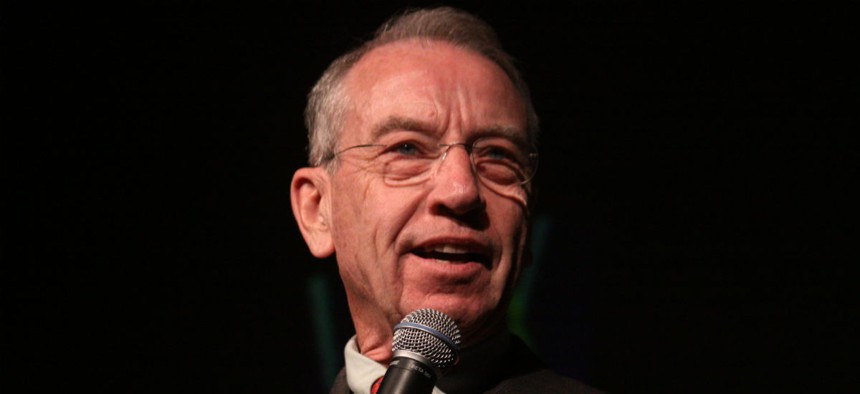
"If the government isn’t properly tracking who has the designation, it may not be looking at whether anyone has a conflict of interest with government service and a private-sector job," said Sen. Chuck Grassley. Flickr user Gage Skidmore
Agencies Don't Know Exactly How Many ‘Special Government Employees’ They Employ
Sen. Grassley sought report after eyeing Clinton aide Abedin’s status at the State Department.
Federal agencies collectively employ more than 1,100 full-time high-level temps called “special government employees.” But counts of SGEs are not always reliable, according to a report released on Monday by the Government Accountability Office.
As a result, said Senate Judiciary Committee Chairman Chuck Grassley, R-Iowa, who requested the report, agencies are at increased risk of running into conflicts of interest. Both Congress and the Office of Government Ethics should address that risk, the senator said.
Grassley’s questions on SGEs—an employment option that dates back to 1962 as a vehicle for agencies to tap expertise without a long-term hiring commitment—stemmed from his learning in 2013 that Hillary Clinton deputy Huma Abedin held that status at the State Department while she simultaneously worked for the Clinton Foundation and a private New York global advisory firm Teneo.
According to GAO’s new report, the government as of December 2014 employed 40,424 expert consultants, 1,138 of which were working as agency employees. The remaining consultants were serving on federal boards. Over the past decade, according to GAO’s numbers from the Office of Government Ethics, SGE’s not on boards averaged about 2,000 governmentwide, and the number dropped steeply from 3,100 in December 2009 to 515 at the end of 2013. Service, with some negotiated exceptions, is limited by law to 130 days.
Examples of SGE use include a need by the State Department to quickly hire a public outreach position for the Arab community and the Justice Department’s need for a special master to administer compensation claims.
The Office of Personnel Management requires agencies to identify SGEs on an individual’s personnel action, while agencies are responsible for reporting their numbers to the governmentwide ethics office. In most agencies, supervisors are responsible for tracking the number of days an SGE has served; otherwise it’s the employee’s task.
GAO studied five agencies—the Health and Human Services, Justice and State departments; the Nuclear Regulatory Commission; and the National Science Foundation. HHS “had difficulty distinguishing between SGEs not serving on federal boards and those who were, and HHS did not explain data discrepancies,” auditors found. Similar shortcomings at State and the NRC, however, were corrected. “Weak internal coordination and misunderstanding about the SGE designation contributed to the identification challenges,” the report said.
“Stronger data would better position agencies to report on SGEs and provide the required ethics training,” GAO wrote. “Moreover, accurate and complete data are important to allow OGE and Congress to provide informed oversight of agencies.”
But the Office of Government Ethics, which has worked in the past to improve tracking of SGEs, has reported few ethics problems with SGEs, despite the flawed data. And GAO’s overall analysis of SGE use at the 23 major departments plus the Consumer Financial Protection Bureau “showed no issues specific to SGEs not serving on federal boards. Further, OGE had no outstanding recommendations related to SGEs at the selected agencies.”
GAO recommended that HHS, in particular, strengthen its coordination of data tracking SGEs, and that the ethics office help agencies strengthen their data through its annual questionnaire.
HHS agreed, while the ethics office added a caveat that it does not believe it has inherent authority to direct human resources offices to collect or share data or to otherwise coordinate with agency ethics offices.
“This report shows government agencies are having trouble determining who should be given this designation and what’s needed to process the designation,” Grassley said in a statement. “This is worrisome because if the government isn’t properly tracking who has the designation, it may not be looking at whether anyone has a conflict of interest with government service and a private-sector job.”
Grassley also expressed displeasure that "the executive branch routinely breaches” the 130-day limit for specialized consultants who come on as SGEs, and said he is considering legislation to better enforce the limit. “Ms. Abedin served significantly more than 130 days,” he said, adding that the State Department, after three years, has still not answered all his questions on her case.







